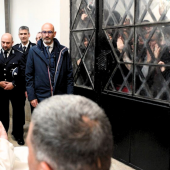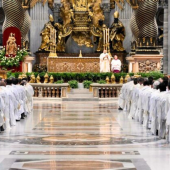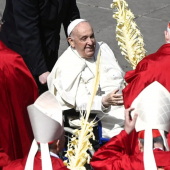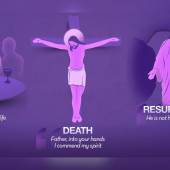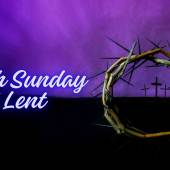Love one another as I have loved you
Holy Week Thursday: April 14, 2022
Mass of the Lord’s Supper
Exod 12:1-8, 11-14/Psa 116:12-13, 15-18/1 Cor 11:23-26/John 13:1-15
Praise the Lord! Dear Sisters and Brothers in Jesus Christ,
Today is Thursday of the Holy Week or the Holy Thursday. Traditionally, Chrism Holy Mass is celebrated in the morning of this day in every Cathedral Church of the diocese to celebrate the Institution of the Holy Priesthood, the collegiality that exists between the diocesan Bishop and the priests and the bond of brotherhood that exists among the priests themselves. The Holy Oils used for various Sacraments of the Church are also blessed during the Chrism mass. But this tradition is not followed in many of the mission countries due to the geographical enormity of the dioceses and related inconveniences and therefore the diocesan bishops organize the Chrism Holy Mass according to their convenience sometime during the Holy Week or even just before that.
The Holy Mass that is celebrated in the evening is called the Mass of the Lord’s Supper. In spite of being a fervent Jew, Jesus Christ, the Son of God turns the tables as he gives a new twist and a new meaning to the Passover Meal when he replaces the unleavened bread, the bitter herbs and the wine with his own Body and Blood. The entire Last Supper was an emotional moment for Jesus, a mystery for the disciples of Jesus seated at the table and since the last two thousand years it has become an emotionally mysterious moment for all the believers and a big question mark for the believers of other faiths as to how can someone offer his own body and blood as food and drink.
Let us now begin our reflections based on the First Reading from the Book of Exodus. The Passover for the Jews was a day of festival for all generations. It was a day of liberation. In fact, the first Passover was an anticipated celebration of that liberation. The choice of the victim of sacrifice, the mode of cooking, the list of the participants for the dinner and the dress code to be strictly followed were all prescribed by the Lord God Himself. The dress code consisted of a girdle around the waist, sandals on the feet and a staff in the hand. All of these point out that the participants of the Passover dinner were travellers. They were all people on the move. They were all people in transition. They moved from slavery to freedom. They moved from a country which did not belong to them and went to a country which the Lord God had promised to Patriarch Abraham ages ago. How did Jesus transform this festival into his own is narrated by St. Paul in the Second Reading of the day in his First Letter to the Corinthians.
In the first place, Paul calls the narrative of the Institution of the Holy Eucharist as something that he received from the Lord himself. Like every head of the Jewish family, Jesus also took the bread and gave thanks to God and broke it and shared it with his disciples. But the words he pronounced before the sharing demonstrate the newness that Jesus brought about. He transformed the bread into his own Body and the wine into his own Blood for the forgiveness of sins and the salvation of humanity. Thus the Eucharist that we celebrate since 2000 years with all its developments has become a redemptive meal. Every time we celebrate it, we proclaim the death of the Lord Jesus because he said time and again: “Do it in memory of me”. Yes! His memory is alive!
St. John the Evangelist calls the entire episode of the New Passover as an act of great and supreme love. Through this, Jesus showed how perfect his love for humanity was. We are also told that Jesus had been waiting for this moment. How many times did he escape from the crowd and walked away from them just because the time had not yet come? How many times did the Jewish authorities plot against Jesus but could never come close to him because his time did not yet come? Yes, now the time has come and Jesus is at table with his chosen ones. Everyone at the table lived mixed emotions and feelings!
Jesus brings up another twist in the Passover Meal when he removed his outer garments, took a towel, wrapped it around his waist, started washing the feet of the disciples and wiped them. Who washed the feet traditionally in the Jewish families in the time of Jesus? It was the job of the slaves. By doing the job of a slave, Jesus demonstrated beyond doubt that authority is meant for service. The Master himself is the first servant. “The Son of Man came not to be served but to serve, and to give his life a ransom for many” (Mark 10:45). The message of culmination comes towards the end of the Gospel reading. Jesus says in John 13:13-15, “You call me Master and Lord, and rightly; so I am. If I, then, the Lord and Master, have washed your feet, you should wash each other’s feet. I have given you an example so that you may copy what I have done to you”. Yes, washing the feet of one another must go on! It calls for greater humility! Celebration of the Eucharist must go hand in hand with the washing of the feet of one another.
Then Jesus comes up with a new commandment, a commandment of love, “Love one another as I have loved you”. The love that we have for one another should be modelled after the love of Jesus. And the biggest sign of love that he offered the humanity is the gift of his Body and Blood. All those who share in the meal will have to express their love not only vertically but also horizontally and that is where the washing of the feet makes sense concretely.
To conclude our reflections, let us take home a few points for our reflections:
- Today is a day to pray for all our priests. God called them and they have said ‘Yes’ to the Lord. All our priests require our prayers and support especially whenever they are in trouble due to various circumstances.
- Let us learn the virtue of humility from Jesus. Whether we live family life or priestly and consecrated way of life, humility wins the hearts of the people.
- Let us learn to love the Eucharist and make it the centre of our lives. Amen!
Radio Veritas Asia (RVA), a media platform of the Catholic Church, aims to share Christ. RVA started in 1969 as a continental Catholic radio station to serve Asian countries in their respective local language, thus earning the tag “the Voice of Asian Christianity.” Responding to the emerging context, RVA embraced media platforms to connect with the global Asian audience via its 21 language websites and various social media platforms.









